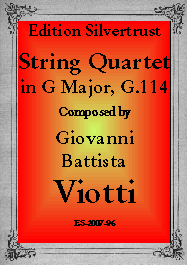Presents
Giovanni Battista Viotti
String Quartet in G Major, G.114
 Today,
if one hears any of Giovanni Battista Viotti's music, it is mostly likely one of the more than 20
violin concertos he wrote. Although he wrote hundreds of works in most every
genre, they have all but disappeared.
Today,
if one hears any of Giovanni Battista Viotti's music, it is mostly likely one of the more than 20
violin concertos he wrote. Although he wrote hundreds of works in most every
genre, they have all but disappeared.
Viotti (1755-1824) was widely considered the greatest violin virtuoso of the 18th century. He was the precursor to Paganini, not only in his development of violin technique but also in his use of Italian vocal melody in instrumental music. Viotti was a student of Gaetano Pugnani, who himself was one of the greatest violinists of the first part of the 18th century. Viotti toured throughout Europe eventually settling in Paris where he lived for many years before moving to London where he stayed until his death.
The String Quartet in G Major, G.114 is one of a set of three concertante works which were composed around 1815 and published in Paris two years later. Concertante style, as opposed to that pioneered by Haydn with its complex accompaniment, gives one voice the solo whilst the others have a simpler, supporting accompaniment. But these three concertante quartets are among the best of their type. Each instrument is given solos throughout and Viotti's gift for lovely melodies is everywhere apparent.
In four movements, the quartet begins with an introductory Larghetto This is followed by the main part of the movement, Allegro commodo which begins with a coy and charming theme that suddenly explodes with energy. The somewhat sad, lyrical theme is first heard high in the cello tenor register. A Minuetto commodo is placed second which, for the time, was unusual. The fetching themes, especially that of the trio section, are models of lovely Italian vocal melody. A languid Andantino follow. Here, Viotti combines the concertante style with the more forward technique found in the Vienna classical composers. In the lively finale, Allegretto vivace, we can see how Viotti's music provided an example which Paganini was to follow.
This quartet, along with the two others in this set which we publish, is not only fun to play and to hear, it is strong enough to be presented in concert by those groups wishing to perform a contemporary alternative to the Vienna composers.
Parts: $24.95